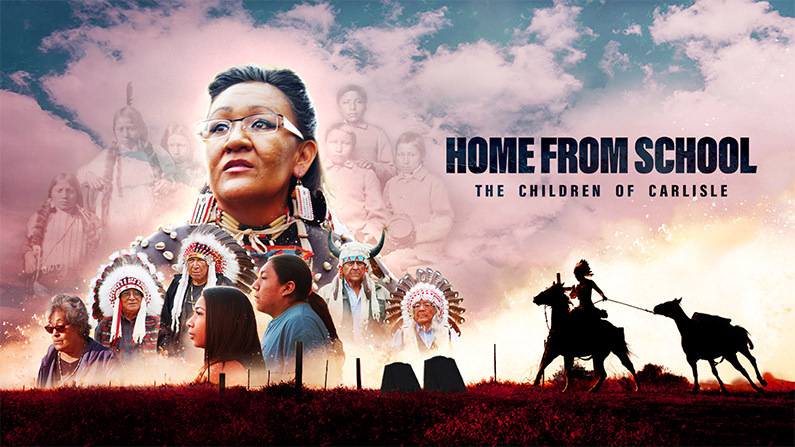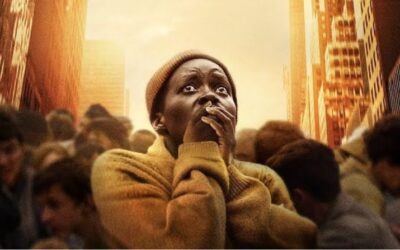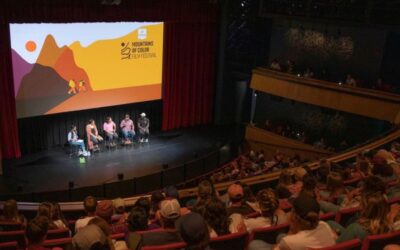November is Native American Heritage Month. One of the events planned in Jackson is a screening of the new documentary, “Home From School: The Children of Carlisle.” It follows the journey of the Northern Arapaho Tribe from the Wind River Indian Reservation to bring home the remains of three children who died at the Carlisle Indian Industrial School in Pennsylvania more than a century ago.
KHOL film critic Jeff Counts spoke to co-producer of the film Sophie Barksdale ahead of the screening at the Center for the Arts on Tuesday, Nov. 9. The following interview has been edited for clarity and brevity.
JEFF COUNTS/KHOL: This is Jeff Counts and you’re listening to “On Set” on KHOL/Jackson Hole Community Radio. I’m joined today by Sophie Barksdale, co-producer of “Home From School: The Children of Carlisle,” a new film out from Caldera Productions. Sophie, welcome.
SOPHIE BARKSDALE: Thank you so much for having me, Jeff.
KHOL: It’s great to have you, and I saw this movie—I got an opportunity to see it last night. And there’s a point made in the film about this story not being widely known outside of the culture it most effects. Talk a little bit about this movie and what the story is actually.
BARKSDALE: Sure. Look, I mean, I think at the heart of the film, we are exploring the history of America. It’s about conquest, it’s about colonization. We’re talking assimilation and sort of diving down into that. It’s the story of the Arapaho tribe really attempting to bring children home from Carlisle Indian Industrial School that died there 100 years ago. Carlisle was the flagship Native American boarding school. At Carlisle, they were really stripped of their culture, their language. They had their hair cut. They were separated from other tribal members, so they were not able to speak to each other.
It’s a history that doesn’t really paint America in a beautiful light. It’s quite out of sync, I think, with that sort of origin story that we hear about America. And so, I think that’s one of the reasons this story continues not to be told within the schools today. I mean, my son is not learning about it at school. But I think also, and the piece that I love the most about this film, is that underneath this story, underneath its history, the film is really about this hopefulness, this resilience and the strength of the Arapaho tribe really pushing to get their children back.
KHOL: Let’s talk about the tough stuff a little bit first. I do want to get back to that hope that you just mentioned, because I think that’s an important message in this movie. But I was struck, Sophie, watching this film by the big numbers that I’m forced to reckon with. Over 200 dead kids, a range of ages from infants to kids in their late 20s at this school. All of the train miles these kids had to travel from the West, from the Wind River range out to Pennsylvania. This is very much a story told through a Wyoming lens, but I get the sense that the team was trying to tell something more national in scope, right?
BARKSDALE: Absolutely. The first tribes were the [tribe indecipherable] and the Apaches, who were taken from Fort Marion and, you know, they were pulled from all the tribes and they really targeted the war tribes, the ones that were in direct conflict with the government. And so, the government really and very openly stipulated, ‘These are the tribes [from which] we want to get those children into the schools because it’s going to be a best behavior bond. They will stop fighting us. We’re going to break these bonds with their families. We’re going to turn them into white people and we’re not going to have to fight them anymore.’ Because they couldn’t win otherwise.
KHOL: You hinted at something before about breaking down the culture as a means towards getting these folks to submit. And I remember this quote from the film, but also from the press material around the film, about ‘Kill the Indian, save the man.’ That seemed to be the operating principle of the U.S. government back in the 1880s. But I feel like the film’s trying to say that the legacy of that mindset is actually at least attempting to be turned into something more hopeful. How does that hope manifest itself in this story, and how does that journey from ‘Kill the Indian, save the man,’ make it all the way into 2017, when these incredible events are happening?
BARKSDALE: You know, I mean, Yufna says in the film—you know Yufna Soldier Wolf really became our star character. I mean, it’s an absolute ensemble story, it’s an ensemble journey, and it’s very much a group effort. But Yufna’s family was key from the very beginning. Her grandfather wrote letters to the school to ask for Little Chief back. Her father wrote letters, uncles. And it got to the point where she was working as the director at the THPO office, the Tribal Historic Preservation Office, and she said, ‘Right, I’m just going to get this done.’ This is something that her family had wanted her to push and others, you know, within the community that were relatives of the other two boys. And I think she had this vision to address the trauma, to bring the trauma out into the open. I mean, there’s a lot of things that are not spoken about on the reservation, and there’s a lot of things that are not spoken about in wider society. And she wanted to bring that out into the open, bring these boys home and start healing.
KHOL: Sophie, this is an incredible film. Everybody needs to know this story. I’m so glad they have an opportunity to. Thank you so much for being with me today and talking about this incredibly important film.
BARKSDALE: Thank you so much for having me.
The free screening of “Home From School” starts at 6:30 p.m. on Tuesday, Nov. 9, at the Center for the Arts in Jackson, followed by a Q&A with the filmmakers and a representative from the Northern Arapaho Tribe. The film will also premiere nationally on the PBS series Independent Lens on Nov. 23.





